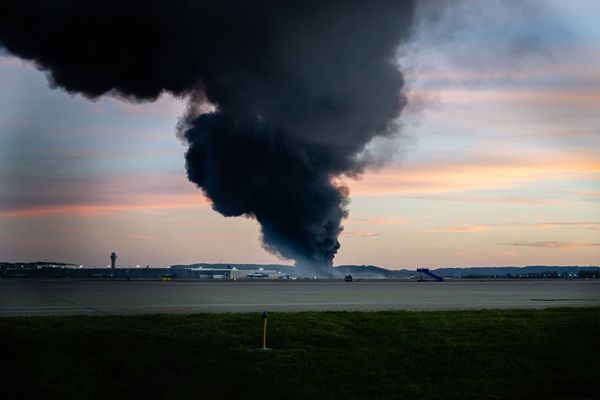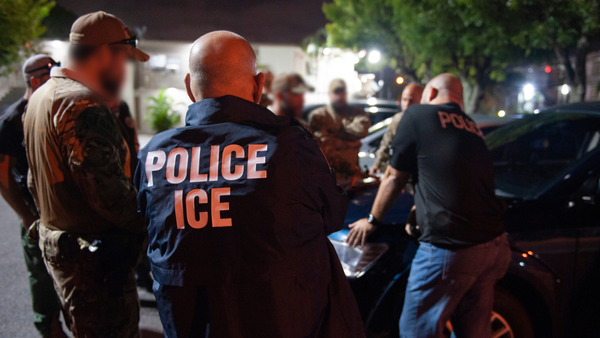KYIV, Ukraine — Under a full-day curfew that brought the city to a standstill, Kyiv awoke Wednesday to air-raid sirens and more pain inflicted on residential neighborhoods as Russian forces — still stalled outside the capital — continued attacks on civilian areas across the country.
Plumes of smoke rose from a 12-story apartment building in Kyiv’s Shevchenkivskyi district, just a few miles northwest of the city center, after shelling left at least two people injured when the building was hit in a predawn attack. Several floors became engulfed in flames and the top floor was destroyed, according to the state emergency services.
The assault took place as a third day of negotiations was set to begin between Ukraine and Russia, the latest attempt to broker peace after the two sides failed to reach agreement during multiple rounds of previous talks.
In an early-morning video, Ukrainian President Volodymyr Zelenskyy said that the demands of both nations were sounding “more realistic.” But he said that “time is still needed for the decisions to be in the interests of Ukraine.”
In Moscow, Russian Foreign Minister Sergey Lavrov agreed that a “business-like spirit” had begun to mark the talks. He told Russian channel RBK TV that “a neutral status [for Ukraine] is being seriously discussed in connection with security guarantees,” but there was no confirmation of that from Kyiv.
Zelenskyy, who met Tuesday with leaders of three European Union and North Atlantic Treaty Organization states — Poland, Slovenia and the Czech Republic — and spoke the same day to the Canadian Parliament in a video address, was scheduled to take his case directly to U.S. lawmakers on Wednesday.
His speech to a joint session of Congress, scheduled for 6 a.m. Pacific time, is expected to add pressure on the Biden administration to ramp up its efforts to help Ukraine.
The Ukrainian president wants the U.S., where Congress recently approved $13.6 billion in emergency military and humanitarian aid for the embattled nation, to send more aid, expand its sanctions against Russia and more aggressively arm and defend Ukraine.
The Biden administration has been steadfast in refusing to support a NATO-enforced no-fly zone over Ukraine because of the risk of direct military confrontation with Russia. It has also resisted Zelenskyy’s calls to transfer Polish MiG fighter jets to Ukraine via a U.S. military base in Germany.
After his speech Wednesday, the White House is expected to announce an additional $800 million in aid to Ukraine.
It’s unclear how much the outpouring of assistance will help the country, which has impressed the world by fending off a bigger, more militarily advanced enemy but also suffered hundreds of deaths and severe losses of territory near many northern, eastern and southern border areas. The United Nations estimates that more than 3 million refugees have left Ukraine for Poland and other European countries.
While he tries to rally more international support, Zelenskyy appeared to shift on the key issue of NATO membership for Ukraine, pursuit of which is enshrined in the country’s constitution. On Tuesday, he said he accepted that his nation would not join the transatlantic alliance.
“It is clear that Ukraine is not a member of NATO — we understand this,” Zelenskyy said in a speech to the Joint Expeditionary Force, a British-led group of 10 North Atlantic countries on rapid crisis response. “For years we heard about the apparently open door, but have already also heard that we will not enter there, and these are truths and must be acknowledged.”
Russian President Vladimir Putin has demanded that Ukraine never join the alliance and cited Kyiv’s desire to do so as a sign of Western aggression toward Russia.
On Wednesday, British Prime Minister Boris Johnson said he agreed with Zelenskyy. There’s “no way Ukraine is going to join NATO anytime soon,” Johnson said during a visit to Abu Dhabi, in the United Arab Emirates.
In Kyiv, residents said it felt like the danger was getting closer even though Russian troops haven’t made deep inroads into the city, and routes in and out of it remained open.
Maria Zhartovska, a 31-year-old local journalist who works for the news website Babel.ua, said she awoke “to the sounds of explosions” for the second day in a row. She lives near the Lukyanivska subway station, which is three miles from Zelenskyy’s office and was shut down after Russian shelling damaged it Tuesday.
“By morning, we heard the air-raid sirens five times,” Zhartovska said.
As afternoon came, a series of loud explosions rumbled through the city center, where the occasional car still drove on streets completely devoid of pedestrians.
The city’s curfew, imposed Tuesday evening because of what Mayor Vitali Klitschko described as a “dangerous moment” in the capital, is scheduled to end Thursday.
Kyiv was not the only city to face overnight attacks. In the northeastern city of Kharkiv, Ukraine’s second-largest, two people were found dead and four were injured after artillery destroyed two residential buildings, the state emergency services said. Part of a school building was also damaged early Wednesday.
____
(Bulos reported from Kyiv and Kaleem from London.)







